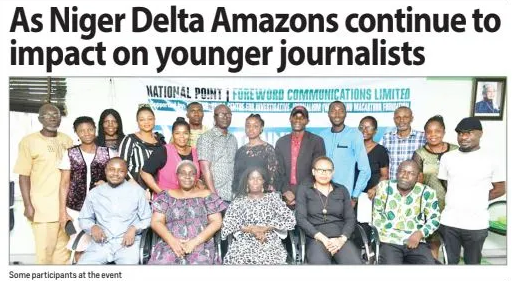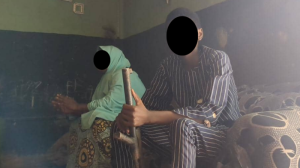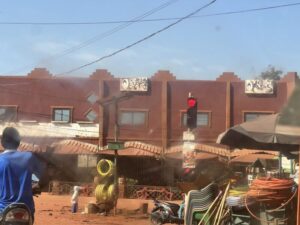For the two strong women from the Niger Delta region in the media industry, the work must go on despite various challenges staring the media business in the face, especially the mainstream media. These two women are Ibiba DonPedro the Managing Director and Constance Meju, the Managing Editor of the National Point/Foreword Communications Limited. For them, training is the in thing and their staff must be taught to keep on pushing for a better society, the reason for the third in-house training series in the last one year. The two-day in house training, which had the theme: ‘Communications, democracy, development and accountability’ with support from the MacArthur Foundation took place between 20 and 22 April 2023 at Port Harcourt, Rivers State.
The in house training brought renowned resources persons who are incidentally journalists like Ezekiel Hart, former General Manager Nigerian Tide, Emmanuel Obe, Patience Saduwa, Sunny Dada and Florence Asieri of Stakeholders Democracy Network with about 20 participants of almost equal genders for good gender balance. Some of the topics covered were basic tools on effective reporting, guide on writing for newspapers, practical data journalism, playing safe, fake news and press manipulation among other topics. The training gave all the opportunity to interact and discuss with colleagues and share ideas once more.
Narrating what always warrants the training, DonPedro said: “This is the third in house training in the last one year,” adding that: “What informed the continuous training is because we are professionals, passionate and activists’ journalists. “We always have training because for us people who inform the society cannot afford to be ignorant. “That is why we are able to do what we do. We are not ordinary journalists and haven been in the media for some decades, this is my 40th year. From my days in The Guardian, we got to see how society really works, what individuals do and the power of the media to make the sort of change that empowers more people like the women, youths, the elderly people, marginalised minorities of ethnicity and religion. “The media by creating a level playing space empowers people to take control of their destiny. To take control and to act with wisdom armed with information. For instance the sort of role the media played during the last elections and for us in particular we are women and we have got to realise that we should stay put in the industry and expand the space for discussion, for empowerment for different levels of people.
“People like us with all our training cannot afford to sit on the fence. I have had training in Nigeria, US and the UK and other places. “Why should we have those sorts of skills and exposure and just go into business? “Yes we do business to keep us going but we are first and foremost journalists. That is why we have to do what we do because millions of people look up to us. By doing what we do, people know that the work we do is very challenging but it empowers us in ways that we shun some people in power and we are very keen about who the bad and the good guys are. Those that really mean well for Nigeria and the Niger Delta.”
“So we don’t have any other choice than to do what we are doing. This is the 16th year of National Point and we are not going to leave all that started with us. I’m going to feel so bad if I see some of our former staff who have contributed and are not doing well.”
In her opening speech the Managing Editor of the National Point, Constance Meju, had said that the essence of the training was to help the participants garner more knowledge, do more deeper reports on accountability, have new skills on how to write with orderliness and to go out there to practice what was taught. She also revealed that the essence of setting up the National Point was to write stories about the Niger Delta which they believe must come to the national fore and to improve the lives of people through accountability in governance, to be the voice of the voiceless and for them to have inclusiveness in reportage.
She said: “We believe in the sustenance of training of staff for better productivity and for better report and greater mileage.”
She continued: “As a journalist you just be broad and keep yourself busy everyday adding that National Points will invest more on digital projects.”
One of the resource persons Ezekiel Hart in his lecture on ‘Basic tools for effective reporting’ revealed that journalism was often confused and sometimes misunderstood by many of its practitioners adding that such misunderstanding was at the root of some difficulties faced by many individuals in the practice of the profession.
Hart said: “In our attempt to properly appreciate journalism, we should begin with first things first adding that there is a need to situate journalism and illuminate its profile for enhanced clarity.”
Stating that understanding journalism is from its elementary features, he stated that: “Journalism’s first obligation is to uphold the truth. Its loyalty is to the citizens. Its key purpose is to verify. Its standard profile is its independence from external influence. Its core mandate is to challenge tyranny and to promote public good over private interest.”
The resources person continued: “A reporter can be someone who gathers information through various sources and presents them to an audience, while a journalist is someone who investigates, and gathers information in form of text, photos, or audio, processes them into acceptable forms and distributes them to the public. “While reporters are responsible for gathering information through several means and presenting it to the public, there are different types of journalists, such as editors, sub-editors, photojournalists, and specialist writers.” He said that in our exciting but very uncertain industry, it is crucial that we develop the right survival skills. Some crucial qualities a budding journalist should have he said include but not limited to inquisitive self-motivated knowledgeable, literate numerate active workaholics’ multi-skilled determined perpetual scholar, risk taker and humility adding that any serious minded reporter should focus towards becoming a specialist or an investigative journalist.
Investigative journalism, he said, focuses on the critical contribution made by in-depth, systematic reporting to fighting corruption, promoting accountability and fostering transparency. “Without investigative reporting, things can go unnoticed, officials become less transparent and the truth becomes blurry.
“In conclusion, it is clear from the above anecdotes that even in Western democracies, unadulterated journalism is under siege by enshrined interests including regular and new forces. “However, as journalists, we owe a duty to society and to ourselves, to serve with integrity and thoroughness, marching on against all odds.” Sunny Dada, who took the participants on practical data assisted journalism, said that journalists should adopt the use of data in journalism because of the eroding reading culture. He said: “You must learn how to use pictorials, chats, maps and others to enhance your media performance adding that all must understand how social media works in Nigeria.
“Let your content make sense and let it be of high quality to attract policy makers.” Some of the applications he said that can be used by journalists to fact check fake news and do others thing are Google image reverse, livid, BS detector, Botometer, YouTube, Data view among others.
In his teaching on writing your stories right, Emmanuel Obe said that journalists should use short words, familiar words, be precise, use short sentences, use facts and not descriptive words etc. One of the participants, Gift Jonah said that what she has learnt will help her to be more efficient in her reporting.



